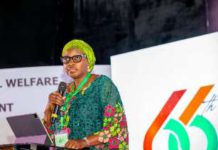By: Joy Odor/Kaduna
It is believed that nearly 50,000 women die each year after undergoing an unsafe abortion performed by an unskilled practitioner, or in less than sanitary conditions.
Also, criminalization of abortion and failure to provide adequate access to services for termination of an unwanted pregnancy are said to be forms of discrimination based on sex.
According to UN Experts in a joint statement to mark the Global Day of Action for Access to Safe and Legal Abortion celebrated 28 September every year on “Restrictive Legislation which denies access to safe abortion said is one of most damaging ways of instrumentalizing women’s bodies and a grave violation of women’s human rights.
According to them, the consequences for women are severe, with women sometimes paying with their lives”.
They lamented that around 40% of the world’s population lives in a country where restrictive abortion laws apply like El Salvador, women who are suspected of having had an abortion may be subjected to prosecution and can end up in prison.
The Experts was of the opinion that evidence gathered over the past decades show that the restrictive approach is inefficient both at making abortion disappear and at promoting women’s health.
“Prohibiting the procedure and punishing women does not reduce the need for abortion and does not have a real impact on driving the numbers down instead the number clandestine abortions that are much more risky for women may increase”.
“It is estimated that 22 million women undergo unsafe abortions worldwide annually, almost all in developing countries. Their health and even their lives are compromised when they resort to unsafe and illegal services”.
“Restrictive laws overwhelmingly disadvantage women from lower socio-economic backgrounds, who have no means of going abroad to gain access to safe abortion services.
“Additionally, unsafe abortions can lead to long term complications, which come at a high economic cost. These include hemorrhage (heavy bleeding), infection, uterine perforation when the uterus is pierced by a sharp object or damage to the genital tract and internal organs which can occur when an unscrupulous and unqualified physicians inserts dangerous objects such as sticks, needles, or broken glass into the vagina or anus to induce a miscarriage.
“In 2006, it was estimated that globally, $680m (£789m, €606m) was spent treating serious consequences of unsafe abortions, a figure which has not gone down in the past decade.
The Experts however suggested that countries that are reluctant to legalize abortion completely should at the very least authorize it “in cases of risk to their life or health, including mental health, rape, incest and fatal impairment of the fetus during the first trimester and later”.
“Indeed, it has been demonstrated that countries where access to information and to modern methods of contraception is easily available and where abortion is legal, have the lowest rates of abortion”, the UN experts concluded”.
“The possibility of accessing safe abortion remains essential. Unwanted pregnancies cannot be totally prevented since no contraceptive method is 100% effective, and women may be exposed to sexual violence” the statement emphasized.
The September 28 Day of Action for Access to Safe and Legal Abortion has its origin in Latin America and the Caribbean where women’s groups have been mobilizing around September 28 the last two decades to demand their governments to decriminalize abortion, to provide access to safe and affordable abortion services and to end stigma and discrimination towards women who choose to have an abortion.
The original name of the campaign in Latin America and the Caribbean is Campaña 28 de Septiember por la Despenalización del Aborto, which continues up to this day growing in force and commitment on the part of women’s rights activists in the region. The date – September 28 – was chosen in commemoration of the abolition of slavery in Brazil which is now remembered as the day of the “free womb” demanding for safe and legal abortion for all women.
















